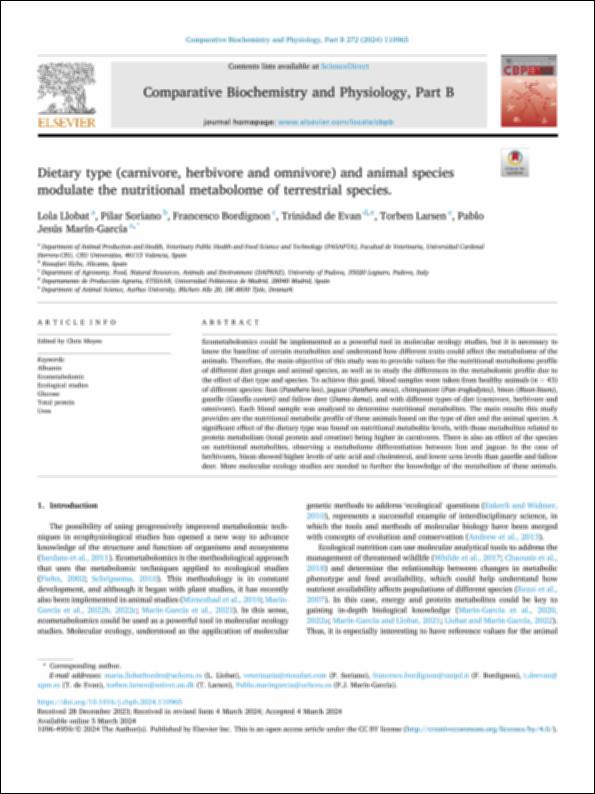Please use this identifier to cite or link to this item:
http://hdl.handle.net/10637/15893Dietary type (carnivore, herbivore and omnivore) and animal species modulate the nutritional metabolome of terrestrial species
| Title: | Dietary type (carnivore, herbivore and omnivore) and animal species modulate the nutritional metabolome of terrestrial species |
| Authors : | Llobat Bordes, Lola Soriano, Pilar Bordignon, Francesco Evan, Trinidad de Larsen, Torben Marín García, Pablo Jesús |
| Keywords: | Metabolismo animal; Animal metabolism; Nutrición animal; Animal nutrition; Biología molecular; Molecular biology |
| Publisher: | Elsevier |
| Citation: | Llobat, L., Soriano, P., Bordignon, F., de Evan, T., Larsen, T. & Marín-García, P.J. (2024). Dietary type (carnivore, herbivore and omnivore) and animal species modulate the nutritional metabolome of terrestrial species. Comparative Biochemistry and Physiology. Part B, Biochemistry & Molecular Biology, vol. 272 (jun.-jul.), art. 110965. DOI: https://doi.org/10.1016/j.cbpb.2024.110965 |
| Abstract: | Ecometabolomics could be implemented as a powerful tool in molecular ecology studies, but it is necessary to know the baseline of certain metabolites and understand how different traits could affect the metabolome of the animals. Therefore, the main objective of this study was to provide values for the nutritional metabolome profile of different diet groups and animal species, as well as to study the differences in the metabolomic profile due to the effect of diet type and species. To achieve this goal, blood samples were taken from healthy animals (n = 43) of different species: lion (Panthera leo), jaguar (Panthera onca), chimpanzee (Pan troglodytes), bison (Bison bison), gazelle (Gazella cuvieri) and fallow deer (Dama dama), and with different types of diet (carnivore, herbivore and omnivore). Each blood sample was analysed to determine nutritional metabolites. The main results this study provides are the nutritional metabolic profile of these animals based on the type of diet and the animal species. A significant effect of the dietary type was found on nutritional metabolite levels, with those metabolites related to protein metabolism (total protein and creatine) being higher in carnivores. There is also an effect of the species on nutritional metabolites, observing a metabolome differentiation between lion and jaguar. In the case of herbivores, bison showed higher levels of uric acid and cholesterol, and lower urea levels than gazelle and fallow deer. More molecular ecology studies are needed to further the knowledge of the metabolism of these animals. |
| URI: | http://hdl.handle.net/10637/15893 |
| Rights : | http://creativecommons.org/licenses/by/4.0/deed.es Open Access |
| ISSN: | 1096-4959 1879-1107 (Electrónico) |
| Supported by: | Acuerdo Transformativo – 2024 |
| Issue Date: | Jun-2024 |
| Center : | Universidad Cardenal Herrera-CEU |
| Appears in Collections: | Dpto. Producción y Sanidad Animal, Salud Pública Veterinaria y Ciencia y Tecnología de los Alimentos |
Items in DSpace are protected by copyright, with all rights reserved, unless otherwise indicated.


